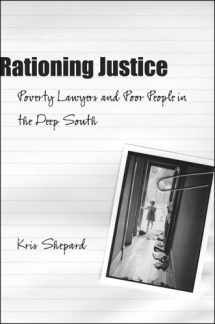
Rationing Justice: Poverty Lawyers And Poor People in the Deep South (Making the Modern South)
Book details
Summary
Description
Established in 1964, the federal Legal Services Program (later, Corporation) served a vast group of Americans desperately in need of legal counsel: the poor. At the program's zenith in 1981, there were more than 1,450 offices employing 6,000 attorneys and 3,000 paralegals. In Rationing Justice, Kris Shepard looks at this pioneering program's effect on the Deep South. It is a story of both success and failure. A historian as well as a practicing attorney, Shepard conducted oral interviews with former poverty lawyers and investigated documents and judicial decisions related to hundreds of cases in Alabama, Mississippi, and Georgia, tracing widespread social change over three decades. Before the advent of the legal services programs, Shepard explains, law was often a weapon of oppression wielded with singular force against impoverished southerners, particularly women and African Americans. By utilizing legal processes, the poor—through poverty lawyers—saw tangible gains in cases involving federal, state, and local social programs, low-income housing, consumer rights, domestic relations, and civil rights. They also confronted the limits of the American legal and political system in its institutional and cultural boundaries—including gender and race—and its limitations of will. Poverty lawyers, Shepard argues, did not by themselves create a legal revolution in the South, but they did force southern politicians, policy makers, businessmen, and law enforcement officials to recognize that they could not ignore the legal rights of low-income citizens. Poor southerners too, Shepard reveals, gained a newfound trust, however tenuous, in the American legal system. His narrative of the relationship of poverty lawyers and their clients, and their interaction with legal, political, and social structures, speaks poignantly to justice for all in America. AUTHOR BIO: Kris Shepard is an attorney in private practice in Charlotte, North Carolina, where he also offers his professional assistance through the Volunteer Lawyers Program and local legal services offices. He is the coeditor of A Call to Conscience: The Landmark Speeches of Martin Luther King, Jr.


We would LOVE it if you could help us and other readers by reviewing the book
Book review



